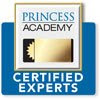Imagine you're a pilot, and you're flying a Boeing 737 filled with more than 100 passengers. Suddenly, the gauges show that Engine No. 2 is in trouble, so you shut it off and start flying the plane on the other engine alone.
To Cut Costs, Airlines Send Repairs Abroad Oct. 19, 2009
That's a troubling enough scenario. But what if it's worse than that: What if it turns out that a mechanic mixed up the wires in the cockpit, not long before you took off — so your gauges are reversed and you actually turned off the one good engine?
Mechanics who had just repaired the plane at the Aeroman repair company in El Salvador had, in fact, crossed the wires on two engine indicators in the cockpit. NPR obtained internal US Airways documents that describe the incident, and a senior company executive confirmed it.
Mistakes In El Salvador
This is just one of at least three troubling maintenance mistakes that mechanics in El Salvador have made recently while fixing US Airways planes. There could be more. But airlines and the Federal Aviation Administration don't make maintenance problems public. NPR first learned about these incidents from mechanics at Aeroman and at US Airways.
Pressure To Hasten Repairs
"It's a great responsibility," one mechanic says, sitting under a cactus along a narrow road near San Salvador. "Our supervisors are constantly highlighting to us that our job is not a game. The life of 200, 250 people that are flying depends on us."
But the mechanics say managers keep pressuring them to fix the planes faster. For instance, if there's rust on a metal beam, but it's just a little over tolerance, "the supervisor says, 'Oh, just leave it like that,' " the mechanic says, through an interpreter. " 'There's no need to repair it.' "
Outsourcing Aircraft Maintenance
Nine major air carriers reviewed by the FAA's inspector general sent 71 percent of their heavy airframe maintenance checks to outside repair stations in 2007, up from 34 percent in 2003. Foreign repair stations got 19 percent of these major maintenance jobs in 2007. The work includes complete teardowns of aircraft.
The FAA requires that mechanics fix the planes according to the airline manuals — whether they're in the U.S. or overseas. But the mechanics at Aeroman say their supervisors often say that takes too much time.
One mechanic says that just a few days earlier, he and his colleagues were replacing a kind of rivet, commonly called a Hi-Lok, along the fuselage. The airline's manual said they should use a "shear" Hi-Lok that's carefully engineered to withstand a specific amount of pressure on a specific part of the plane. But the mechanic says Aeroman didn't have the right Hi-Loks on hand, so the supervisor told them to use "tension" Hi-Loks that weren't approved for that repair.
The mechanic says he resisted, because the wrong Hi-Loks "would cause, actually, a crack in the fuselage when there is turbulence." When the supervisor pressured him to use the incorrect part anyway, "I told him no, because the manual does not allow me to do that," he says. But the supervisor ordered him "to go ahead and install it, because we were in a hurry to turn around the airplane."
Another mechanic ticked off other problems at Aeroman. Some employees don't store glues at the required temperatures, he says. That means the glues could fail — which potentially means that parts of the airplane could fall apart.
And this mechanic says some workers can't even read the airlines' repair manuals. The manuals are written in English, but some mechanics at Aeroman can't read English including him.
FAA Inspections: No Surprise
In theory, FAA inspectors should catch these problems. The FAA is supposed to inspect every repair shop that fixes U.S. airplanes, in the U.S. and overseas. But the mechanics at Aeroman say FAA inspections are a joke, because the inspectors always tell management at Aeroman when they are going to show up — they do not do surprise inspections.
That means mechanics put the glues away in the proper temperature-controlled storage areas. They get rid of any unauthorized parts. "Then, the FAA won't ever find anything," the mechanic says. The inspector general's investigations have found that FAA inspectors never even showed up at some foreign repair stations, for as long as three to five years.
Legislative Action
Some aviation specialists and members of Congress say that as the industry cuts maintenance costs and other expenses, the margin of safety is getting thinner.
Sen. Claire McCaskill (D-MO) is pushing legislation in Congress that would require the FAA to be tougher on foreign repair companies. "When you have a situation like this," McCaskill says, "and the company in El Salvador is going to make a lot more money if they can promise the planes out more quickly, then that is a dangerous stew that we are stirring."
In late September 2009, US Airways discovered another mistake at Aeroman: Mechanics mixed up the wires in the cockpit of another plane — the second case of crossed wiring in less than a week. Again, the gauges were connected to the wrong engines.
Here is a list of airlines that outsource their heavy airframe maintenance: AirTran Airways, Alaska Airlines, America West Airlines, Continental Airlines, Delta Air Lines, JetBlue Airways, Northwest Airlines, Southwest Airlines, and United Airlines. http://pamablog.typepad.com/pama/outsourcedcontract_maintenance/
Links to this story:http://www.npr.mobi/templates/transcript/transcript.php?storyId=113877784http://search1.npr.org/templates/story/story.php?storyId=113877784&ps=cprshttp://www.npr.org/templates/story/story.php?storyId=113942431
Thursday, October 22, 2009
Are the Planes We Fly in Safe?
Subscribe to:
Post Comments (Atom)





No comments:
Post a Comment